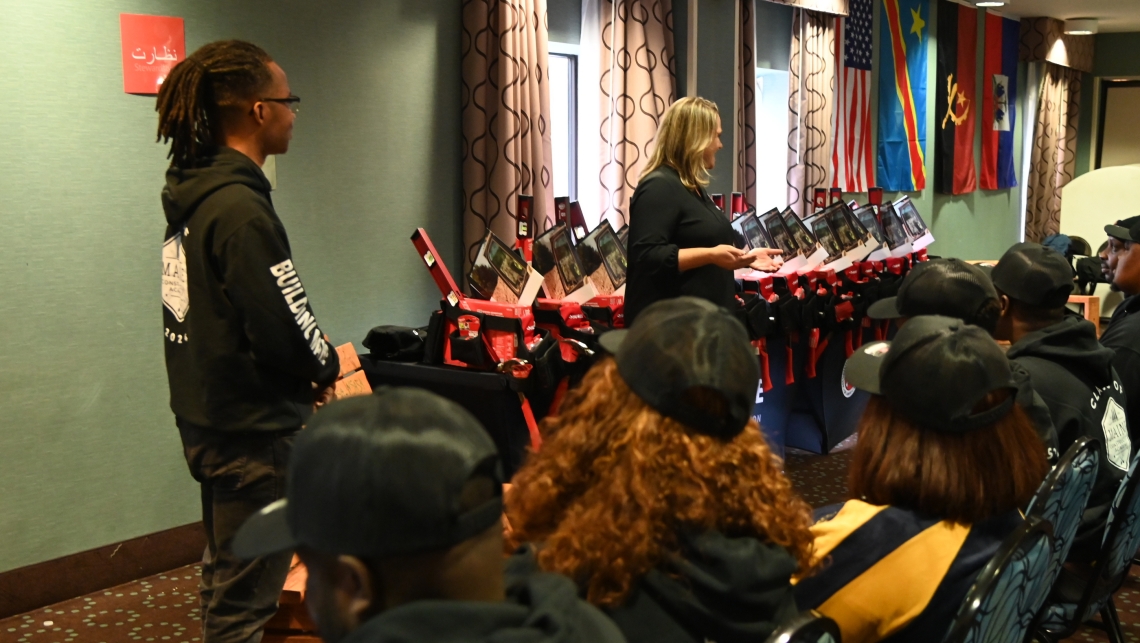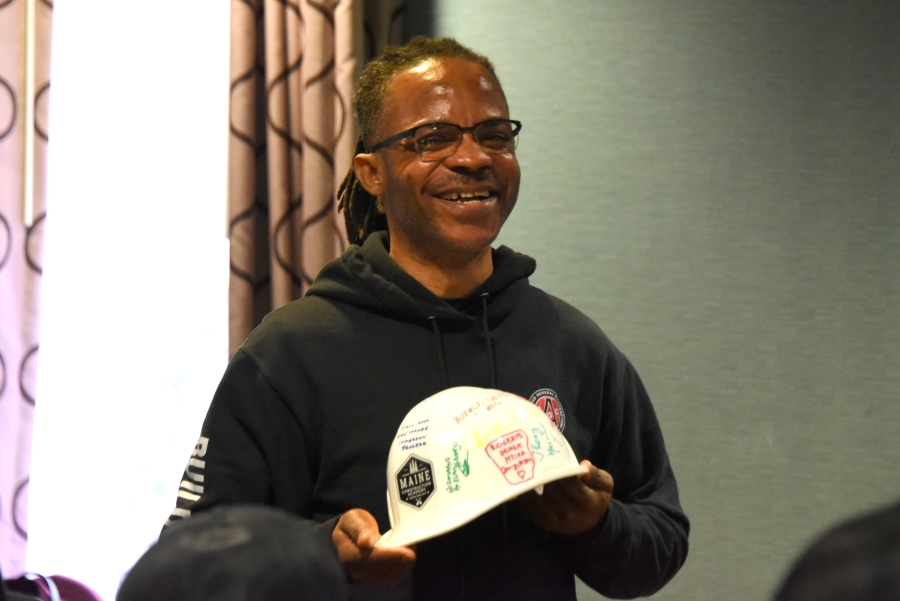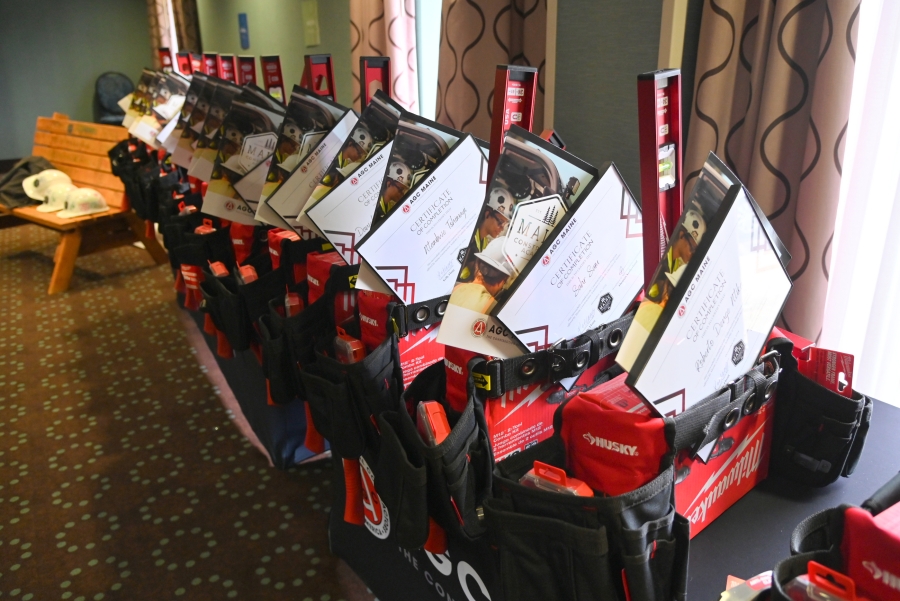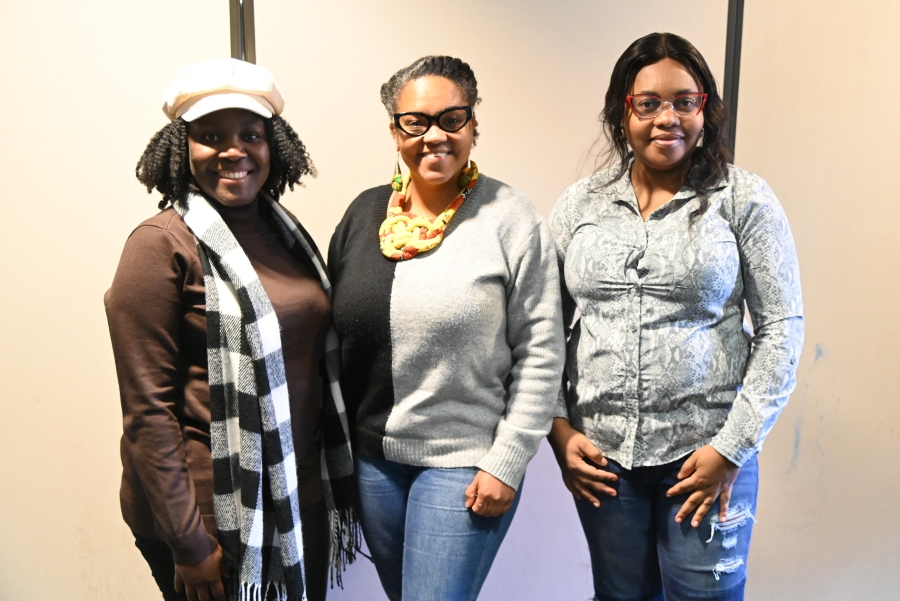Working towards building new lives in Maine

Amid cheers and applause, 17 men and women stepped forward to receive certificates confirming their completion of a construction industry pre-apprenticeship program. The graduates are all hoping it will be a step towards landing jobs in Maine’s construction industry, but that is not the only thing they have in common. All of them are also asylum seekers looking to rebuild their lives.
“The goal is to help the new Mainers who are in the asylum seeker transitional housing program to gain construction skills. Some of them already have skills. Some of them are gaining them anew, but most importantly, they’re learning skills that can be applied in the U.S. job market, especially here in Maine where there is a high construction job demand,” says Charles Mugabe, director of migration for Catholic Charities Maine.
The pre-apprenticeship program was facilitated by Associated General Contractors of Maine (AGC Maine) in partnership with Goodwill, the Maine Department of Labor, and Catholic Charities Maine. It is a six-week program that combines on-site training with classroom instruction, which was held at a southern Maine hotel where many are temporarily living. The program was similar to one that AGC Maine developed for use in high schools and tech and career centers, but it was lengthened to include English language instruction.
“This approach helps them improve their English language skills as they learn. Why? Because when they start their job, it is essential to be able to understand instructions, especially safety concerns,” says Mugabe. “The class is a combination of theory, practice, and mathematics. So they learned a lot about U.S. safety standards and protocols. They learned a lot about the construction work itself within various domains. They learned about measurements. The measurements in other countries and here are very different, so that’s a critical piece.”
Some of the participants previously worked in construction while for others, it will be a new career.
“In construction, I have some experience but not much. What I learned here is very important to me,” says Frederic, a former storekeeper who is originally from Burundi but lived in Uganda before coming to the United States. “We went to different job sites, and I have seen how they do construction of houses, how they do it in the weather, along with electricity and safety.”
“I learned more about the codes that I need to work here in the United States, which are much different than where I am from,” says Krisner, who is originally from Venezuela but then worked in construction for six years in Colombia before coming to the United States. “It is the knowledge overall and then the codes to work here and also the laws that I have to apply to succeed in my work here.”
The workers aren’t the only ones hoping they succeed in the construction industry, so are employers. Kelly Flagg, the executive director of AGC Maine, says there is a great need for construction workers in the state.
“Construction projects are growing. The size of construction projects are growing. The complexity of construction is growing, and that’s not going to change in the foreseeable future. If you look at our state’s construction needs, we have a need for housing, right? That’s going to require somebody to build it. We have some clean energy initiatives. People are going to be required to build those things. We have road and bridge repair needs. People are required to build those things. So, as you look at all of the things that we need construction workers for, the need for individuals entering craft positions is growing,” she says. “Couple that with a retiring workforce. The average age of a construction worker in Maine is in the high 40s, so we do need to start thinking about where we find the next generation of workforce for construction.”
To help the workers get on their way, AGC Maine presented each of them with a new tool kit. The association also invited potential employers to conduct job interviews with the asylum seekers prior to the graduation ceremony. There was a previous class to this one, and of the 18 people who graduated from that one, 16 are still working in the construction field. It was anticipated that these workers would find similar success, but the country’s changing immigration policies have made the future more uncertain.
“With shifting immigration policies and the risk of losing work authorization, we’re finding employers now hesitant to hire immigrants, fearing legal complications, workforce instability, and potential penalties. This uncertainty not only affects businesses but also prevents skilled and dedicated workers from contributing to our local economy,” says Mugabe.
Along with the pre-apprenticeship program, Catholic Charities is also helping to support a group of asylum seekers hoping to get jobs in another Maine industry sorely in need of workers — childcare.
“We know childcare to be an outstanding challenge in Maine, and therefore, we are working closely with the Department of Labor and our other partners to figure out solutions,” says Mugabe.
Catholic Charities partnered with the Department of Labor, Coastal Enterprises, Inc., and the Maine Roads to Quality Professional Development Network to help a group of women get the needed licenses and certification to either join an established childcare provider or to start their own childcare businesses.
“From the first month to the second month, it was all about telling them what is childcare, how you can open your own business, and things like that. And the second month to the third month was all about licensing and certification,” explains Stephanie Nieves, an employment case manager for Catholic Charities. “We don’t want to jump any step. We want to make sure they kind of hit every single thing that is important to be able to be childcare-certified and to be someone that is really there to help children or to take care of children.”
That included learning safety procedures, such as CPR, and it included a financial literacy class offered by M&T Bank, which was especially designed for women who might want to open their own childcare facility.
“This is just for them to understand how to get a business loan, how to build your credit, how you can take care of your finances,” says Nieves.
Nieves says childcare was an ideal fit for some of the women because they are already mothers.
Desanges, originally from Democratic Republic of the Congo, says she hopes to provide day care services while her son is in school.
“Before, I took care for a long time [of] the old people. Now I need to care for the children,” she says.
Olna, originally from Haiti, says she would eventually like to become a certified nursing assistant but also loves working with children.
“I worked in childcare for five months, but that’s why I want to learn more about children. I want to know more. That’s why I am taking this class,” she says.
Erika, originally from Angola, worked in Spain as an artist, teaching painting to children, and says she looks forward to having that opportunity again.
“I love to work with kids and love to teach them art,” she says.
Nieves says Erika was one of two women in the group selected by the United Way to receive funding to help them start their own businesses. There is also a hope that some of the program participants may join together to offer childcare services to other asylum seekers, allowing them to also seek employment.













